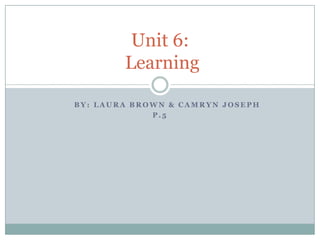
Unit 6 learningrev[1] final
- 1. Unit 6: Learning BY: LAURA BROWN & CAMRYN JOSEPH P.5
- 2. Key Ideas Classical Conditioning Operant Conditioning Cognitive processes of Learning
- 3. How We Learn: Learning- a relatively permanent change in an organism’s behavior due to experience 2 types of Associative learning: 1. Classical Conditioning- type of learning in which one learns to link two or more stimuli and anticipate events 2. Operant Conditioning- A type of learning in which behavior is strengthened if followed by a reinforcer or diminished if followed by a punisher
- 4. Classical Conditioning A type of learning first described by Ivan Pavlov and the infamous “dogs”!
- 5. Classical Conditioning Acronyms UR or unconditioned response is a not learned: salivating when food** is presented US or unconditioned stimulus** is the food. CR or conditioned response is how the bell signaled food for the dog CS or conditioned stimulus is the bell that had been neutral but now means food Remember: Conditioned = Learned Unconditioned = Unlearned
- 6. Processes of Classical Conditioning: Higher-order conditioning- a procedure in which the conditioned stimulus in one experience is paired with a new and neutral stimulus creating a second often weaker conditioned stimulus Example: By using a dog and a bell in the Pavlov trials, the dog salivates to the bell, then the bell can be paired repeatedly with a flash of light and the dog will eventually salivate to the light alone as well as the bell.
- 7. Processes Continued Extinction -the diminishing of a conditioned response Occurs when a conditioned stimulus no longer signals an impending unconditioned stimulus Example: In previous example, if you ring a bell over and over again and never feed the dog, the dog will ultimately learn not to salivate when the bell rings
- 8. Processes Continued Spontaneous Recovery Appears after extinction and without training The response briefly appears upon presentation of the conditioned stimulus after a brief period of not having it.
- 9. Processes Continued Generalization - Occurs once a response has been conditioned Similar stimuli to the conditioned stimulus elicits similar responses Example: Little Albert was conditioned to fear white rats, he also feared other things that resemble white such as white rabbits and Santa Clause’ white beard
- 10. Processes Continued Discrimination - The learned ability to distinguish between a conditioned stimulus and other irrelevant stimulus Example: The dog knows the sound of the bell for the food so he will not respond to a bell being played on the radio.
- 11. Operant Conditioning Operant Conditioning A type of learning in which behavior is strengthened if followed by a reinforcer or diminished if followed by a punisher
- 12. Operant Conditioning Law of Effect Developed by E.L Thorndike, conducted experiments in a puzzle box States that behaviors followed by satisfying or positive consequences are strengthened and more likely to occur Behaviors followed by annoying or negative consequences are weakened and less likely to occur
- 13. Operant Conditioning B.F. Skinner Interested in the ABCs of Behavior Designed an operant chamber (Skinner Box) Contained a bar or key that an animal can manipulate to obtain a food or water: reinforcer
- 14. Operant Conditioning B. F. Skinner Developed four different training procedures -Positive Reinforcement -Negative Reinforcement -Positive Punishment -Negative Punishment
- 15. Operant Conditioning ***Positive- something is added (not always good!) ***Negative-something is taken away(not always bad)
- 16. Operant Learning Reinforcement Schedules Continuous Reinforcement- reinforce the desired response every time it occurs Partial Reinforcement- Reinforcing a response only part of the time Fixed-Ratio Schedule- Reinforces a response only after a specified number of responses (Every so many) Fixed-Interval Schedule- Reinforces a response only after a specified time has elapsed (Every so often) Variable-Ratio Schedule- Reinforces a response only after a specified time has elapsed (Unpredictable #) Variable-Interval Schedule- Reinforces a response at unpredictable time intervals (Unpredictably often)
- 17. Operant Learning Fixed-ratio- “definite, definite number, fixed amount” (buy 2 shirts get one free) Fixed-interval- “definite period of time” (Checking cookies after the 10 min baking period)
- 18. Operant Learning Variable-Ratio Schedule- “unpredictable #”, gamblers schedule” (Playing a slot machine) Variable-Interval Schedule- “unpredictable amount of time “ (Mr. R’s pop quizzes)
- 19. Cognitive Processes in Learning Latent Learning- learning that occurs but is not apparent until there is an incentive to demonstrate it Insight learning- a sudden and often novel realization of the solution to a problem , occurs after little or no interaction with our environment Observational learning- learning by observing others
- 20. Cognitive Processes in Learning Observational learning (continued) Mirror Neurons- frontal lobe neurons that fire when performing certain actions or when observing another doing something!
- 21. Cognitive Processes in Learning Albert Bandura: Bobo Doll Experiment -Kids imitated adults’ actions to a doll We are especially likely to imitate people we perceive as similar to ourselves, as successful, or as admirable
